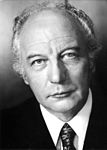West German federal election, 1969
|
|
|||||||||||||||||||||||||||||||||||||||||||||||||||||||||||
|
|||||||||||||||||||||||||||||||||||||||||||||||||||||||||||
|
|||||||||||||||||||||||||||||||||||||||||||||||||||||||||||
|
|
|||||||||||||||||||||||||||||||||||||||||||||||||||||||||||
| Party list election results by state: red denotes states where the SPD had the absolute majority of the votes; pink denotes states where the SPD had the plurality of votes; darker blue denotes states where CDU/CSU had the absolute majority of the votes; and lighter blue denotes states where CDU had the plurality of votes | |||||||||||||||||||||||||||||||||||||||||||||||||||||||||||
|
|||||||||||||||||||||||||||||||||||||||||||||||||||||||||||
Federal elections were held in West Germany on 28 September 1969. The CDU/CSU remained the largest faction and the Social Democratic Party remained the largest single party in the Bundestag, winning 237 of the 518 seats.
Upon the resignation of Chancellor Ludwig Erhard on 1 December 1966, a grand coalition of Christian Democrats and Social Democrats had governed West Germany under Federal Chancellor Kurt Georg Kiesinger (CDU) with SPD chairman Willy Brandt as vice-chancellor and foreign minister.
Economics Minister Karl Schiller (SPD) had proposed revaluing (increasing the external value of) the Deutsche Mark, West Germany's currency, to reduce the country's inflation rate and the rate of growth of the country's businesses' income. He also wanted to reduce West Germany's economic dependence on the exports. However, his counterpart Finance Minister Franz-Josef Strauss (CSU) rejected the Deutsche Mark's revaluation, because his strong supporters, the Bavarian farmers, also opposed it. After all, the European Economic Community's foodstuffs prices were paid in US dollars, and the Deutsche Mark's revaluation would have made them less favourable for the West German farmers (i.e. more expensive for other Western Europeans to buy).
...
Wikipedia




